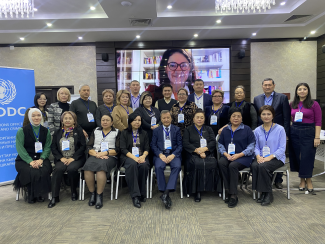National policymakers and key stakeholders in Kyrgyzstan enhance their knowledge on drug use disorder system Quality Assurance through UNODC training

The UNODC Regional Office for Central Asia (ROCA) conducted a National Training “UNODC Drug Use Disorder Treatment Systems Quality Assurance (QA)” which took place in Bishkek, Kyrgyzstan on 28-30 November 2022.
This capacity building exercise was conducted in the framework of the UNODC global project GLOJ71 “Treating drug dependence and its health consequences: Treatnet II” in collaboration with Sub-programme 3: Addressing drug problems, increasing treatment of drug use disorders, and preventing HIV/AIDS” of the UNODC Programme for Central Asia 2022-2025. Moreover, the event was implemented together with the UNODC Prevention, Treatment and Rehabilitation Section and with the generous support of the U.S. Department of State’s Bureau of International Narcotics and Law Enforcement Affairs (INL).
During his welcoming speech, Mr. Borikhan Shaumarov, Senior Programme Officer of UNODC ROCA highlighted that drug dependence is considered a multi-factorial health disorder that often follows the course of a relapsing and remitting chronic disease and that presents a significant burden for affected individuals, their families, and communities. He stressed that untreated drug use disorders trigger substantial costs to society including lost productivity, increased health care expenditures, costs related to criminal justice and to social welfare, and other social consequences.
“Providing effective treatment and care services for drug use disorders as part of an integrated and well-coordinated treatment system is a critical investment in the health of people with drug use disorders. It is also an investment in the healthy and safe development of families, communities, and countries”, outlined Mr. Borikhan Shaumarov.
The event gathered some 24 professionals and experts from all oblasts of Kyrgyzstan and aimed at providing support to national stakeholders in System Quality Assurance (QA), sensitize participants to drug use and drug use disorders, highlight evidence-based responses, and strengthen participants’ knowledge on the QA of the drug use disorder treatment services and systems.
Training participants were from institutions and departments responsible for the QA of services, including representatives of the Department of Medical Care Organization and Drug Policy of the Ministry of Health, members of the National Working Group on QA of the drug dependency treatment services, heads, and coordinators of the Republican and Regional Psychiatry and Narcology Centers, as well as representatives of the Republican and Regional Compulsory Medical Insurance Fund.
The training was delivered by a UNODC International trainer in an on-line format. Two national co-trainers from Kyrgyzstan assisted the leading trainer.
The on-line training replicated the participatory nature of the face-to-face training and featured plenary presentations by the leading trainer, a range of break out group exercises with feedback, and large group discussions in plenary. This capacity building exercise aimed at looking at national system standards and comparing the local system quality in line with the with the International Standards for the Treatment of Drug Use Disorders.
“I would like to note that the training is not only useful in obtaining information on the Key quality standards for service appraisal: Quality assurance in treatment for drug use disorders (pre-publication version) , but also in terms of analyzing structure of the entire drug use disorder treatment system. International experience shows that the quality of services should be not only at the level of a medical facilities providing assistance to people with substance use disorders, but also throughout the entire system of services. A lot of situational tasks gave participants tools to assess the quality of services provided”, said the Deputy Minister of Health of the Kyrgyz Republic during official closing ceremony of the event.
According to her, “It became clear that these quality standards should be implemented not only in the drug treatment system, but also in all services providing medical care for other diseases. I think it will be very useful to introduce these quality standards at the level of the Ministry of Health, first with regard to drug use disorder treatment services, with further introduction to other medical services”.
